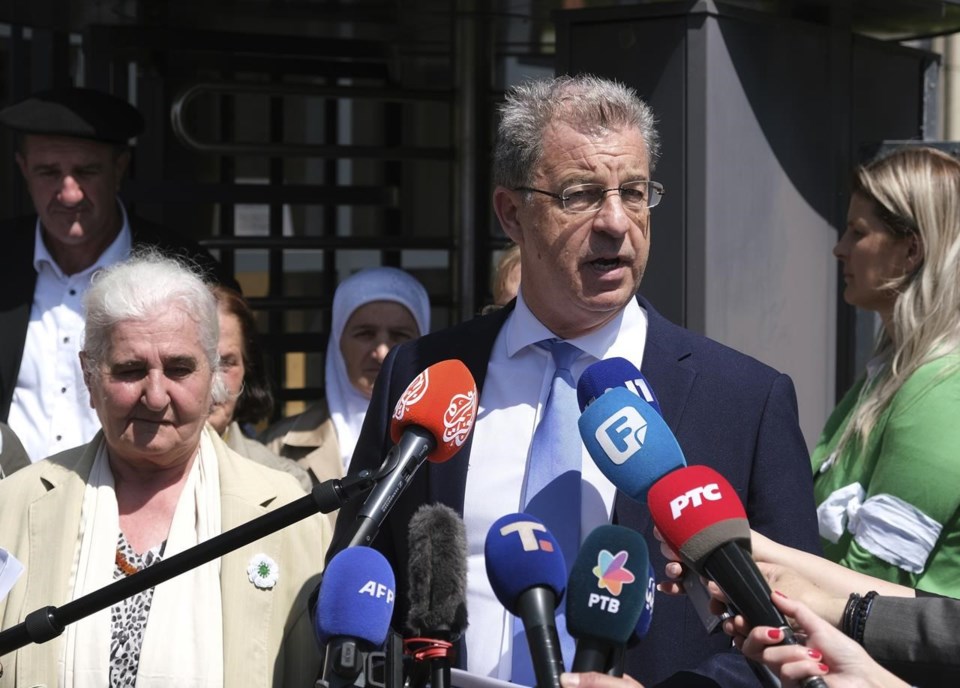THE HAGUE, Netherlands (AP) — U.N. appeals judges on Wednesday significantly expanded the convictions of two allies of late Serbian President Slobodan Milosevic, holding them responsible for involvement in crimes across Bosnia and in one town in Croatia as members of a joint criminal plan to drive out non-Serbs from the areas during the Balkan wars.
The appeals chamber at the International Residual Mechanism for Criminal Tribunals overturned their acquittals of involvement in the criminal plan and raised the sentences of Jovica Stanisic and Franko Simatovic from 12 to 15 years.
Presiding Judge Graciela Gatti Santana said the two men, both now in their 70s, “shared the intent to further the common criminal purpose to forcibly and permanently remove the majority of non-Serbs from large areas of Croatia and Bosnia and Herzegovina through the commission of the crimes charged in the indictment.”
The appeals ruling brings to an end the longest-running war crimes prosecution dating back to the Balkan wars of the early 1990s.
Milosevic was put on trial for his alleged involvement in fomenting the bloody conflicts that erupted as Yugoslavia crumbled but he died in his cell in 2006 before verdicts could be reached.
The mechanism's chief prosecutor, Serge Brammertz, hailed what he called a "really important” ruling.
“This is the only decision we have with officials from Belgrade convicted as part of the joint criminal enterprise,” he said.
Stanisic was in court for the hearing, while Simatovic watched by video link from a U.N. detention unit.
Gatti Santana called the appeals ruling a “milestone” for the court — which deals with cases left over from the now-defunct U.N. war crimes courts for the former Yugoslavia and Rwanda — as it was the final case dealing with war crimes from the wars that erupted in the early 1990s as Yugoslavia crumbled.
Stanisic and Simatovic were convicted two years ago of aiding and abetting murder and other crimes committed by Serb paramilitaries in 1992 in the Bosnian town of Bosanski Samac but acquitted of responsibility for other crimes. The appeals chamber reversed both those findings and raised their sentences.
The length of the case underscores the complexity of successfully proving war crimes in international courts, amid international calls for perpetrators of atrocities during the current war in Ukraine to be brought to justice.
Stanisic, a former head of Serbia’s State Security Service, and Simatovic, a senior intelligence operative with the service, are the only Serbian officials to have been convicted by a U.N. court of involvement in crimes in Bosnia.
Stanisic and Simatovic initially were acquitted a decade ago by the U.N.'s Yugoslav war crimes tribunal but an appeals chamber later ordered a retrial.
Brammertz said that war crimes trials would continue in the Balkans as many victims and survivors still await justice.
“For us, it was the last case,” Brammertz told reporters. “But we know there are hundreds of cases which still need to be prosecuted domestically.”
Munir Tahirovic, leader of an association of victims of war and genocide in Northern Bosnia, said that he had been waiting 30 years for a verdict linking Belgrade to crimes in his country.
“This judgment also proved that Serbia committed aggression not only on Bosnia and Hercegovina, but also Croatia,” he said.
Rights group Amnesty International's Europe Researcher, Jelena Sesar, said the ruling “leaves no doubt about the involvement of Serbia’s police and security services in the wartime atrocities in Bosnia and Herzegovina, which is something that Serbia’s authorities continue to deny to this day.”
Mike Corder, The Associated Press




